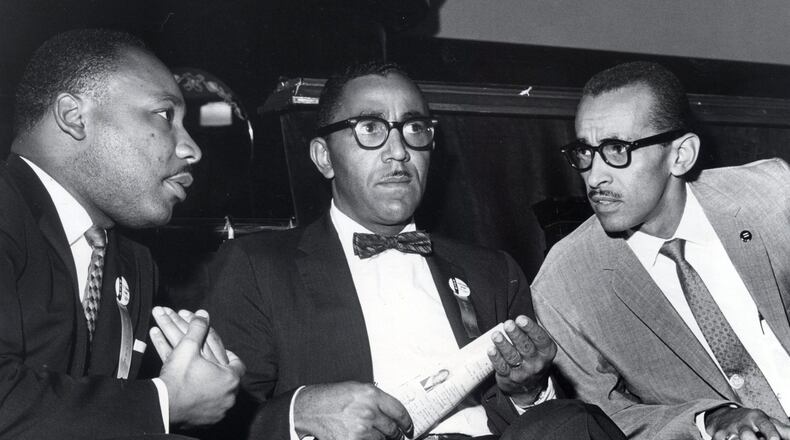The Rev. Wyatt Tee Walker, the influential executive director of the SCLC and one of Martin Luther King Jr.’s key strategists credited with planning the Birmingham Campaign, died Tuesday at his home in Chester, Va.
The death of Rev. Walker, who was also the first board chairman of Al Sharpton’s National Action Network, was confirmed Tuesday afternoon in a tweet by Sharpton, who called him “A true giant and irreplaceable leader.”
“A huge tree has fallen,” Sharpton said.
Walker’s passing at the age of 88 marks the closing of another chapter in the era of civil rights.
“We lost a great soul. Another member of that community that is most important to who we are as a nation,” said Bernice King, the youngest daughter of King and CEO of the King Center. “It is a heaviness. That generation is now leaving us.”
Ambassador Andrew Young, who technically worked for Walker at the SCLC, put it simply: “We are all going.”
Walker lived and worked in Atlanta for the SCLC only four years, from 1961 – 1965. But his life after Atlanta saw him become a towering ministerial figure in New York City as he preached against injustice and intolerance and for better schools and neighborhoods.
He left the SCLC in 1965 to become pulpit minister at the Abyssinian Baptist Church, with the intent of succeeding Adam Clayton Powell. With that becoming less likely, he took over as pastor of Canaan Baptist Church of Christ in Harlem, where he remained for 37 years.
“Dr. Walker was the quintessential pastor, preacher and prophet,” said the Rev. Richard Wills, the pastor of Friendship Baptist Church in Atlanta. “But beyond that, he was a civil rights leader in his own right.”
Rev. Wills visited Walker this weekend before his passing, and from 1996 until 2000 served as his assistant pastor at Canaan Baptist. Rev. Wills said when he arrived in Harlem from Montgomery in January 1996, he was unprepared for the freezing temperatures. One Sunday, Walker looked at his shivering assistant and ordered him to get a leather jacket out of his closet.
“He took me as his son,” the Rev. Wills said. “I had the highest regard for Doc. He could be tough, but that was tempered by his amazing generosity.”
Rev. Walker was born on Aug. 16, 1929 to Maude Pinn and John Wise Walker in Brockton, Mass. Although his grandfather was a slave, Walker’s parents were both college graduates with his father being in Virginia Union University’s first graduating class in 1899.
In 1946, after graduating from high school in New Jersey, he followed in his parents’ footsteps and with $100 in his pocket to cover a year’s tuition, enrolled at Virginia Union. He graduated in 1950 with degrees in physics and chemistry.
That same year, on Dec. 24, 1950, he married Theresa Edwards. They had three sons, Wyatt Jr., Robert and Earl, and a daughter, Ann.
Walker received a master’s degree in divinity in 1953 from Virginia Union. It was during this period that he met another young theology student at an inter-seminary meeting: Martin Luther King Jr., who was attending the Crozer Theological Seminary in Pennsylvania.
Walker and King became close friends and in 1957 joined in starting the SCLC.
"He was the number one man for Martin and as a result of that, everyone had to think about him," said the Rev. C.T Vivian. "And he had to think about them. He had been very creative during that time."
In 1961, at the urging of King, he moved to Atlanta to serve as executive director of the Southern Christian Leadership Conference, where he was King’s right-hand man, planning all strategic and logistical aspects of the movement from what time of the day to march to paying staffers. He also fundamentally shifted the SCLC from a loose volunteer organization to a tight, focused unit, with clear strategic goals.
“He really got the organization set up in Atlanta,” Young said. “He was the one that assembled the staff, did all of the ground work. He was my boss when I came there. His legacy was he helped transform SCLC into the movement it became. Wyatt never missed a beat.”
His planning for Birmingham was a framework for all future movements across the South.
"He was a very brilliant tactician and strategist," Bernice King said. "He helped to organize the Birmingham Campaign with Fred Shuttlesworth, which was one of the most pivotal moments of the movement. If Birmingham had not happened, the nation would not have rallied around what they were doing. We owe it to him."
The Birmingham Campaign of 1963, where hundreds of marchers – mostly children – were arrested, beaten and sprayed with fire hoses, was one of the more pivotal moments of the civil rights movement as television cameras brought national attention to what had been seen as a Southern problem. Wyatt specifically wanted to take advantage of public safety commissioner Bull Connor’s penchant for violence.
“My theory was that if we mounted a strong nonviolent movement, the opposition would surely do something to attract the media, and in turn induce national sympathy and attention to the everyday segregated circumstance of a person living in the Deep South,” Walker said.
The Rev. Wills said funeral arrangements have not been set yet, but services will be held in Petersburg, Va. and in Harlem.
“Wyatt was a fine fellow and he worked hard in the movement,” said the Rev. Joseph E. Lowery, who chaired SCLC’s board when Walker was executive director. “Wyatt had a talent for a lot of things but the one I remember was, he could pull people together toward a common goal and not let them stray away from the mission.”
Read and sign the online guestbook for Rev. Wyatt Tee Walker
About the Author
The Latest
Featured



